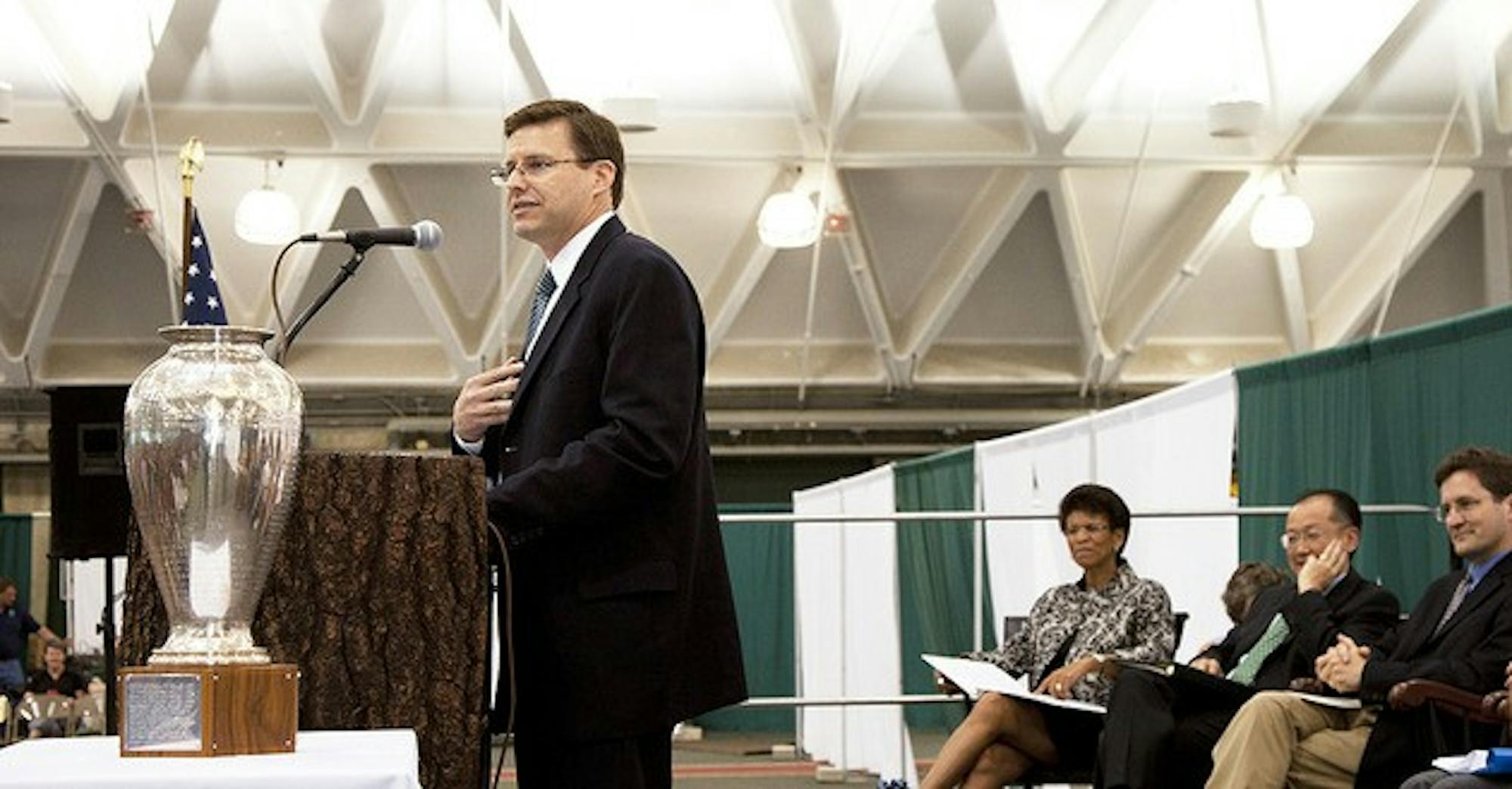I must admit that I initially could not help but roll my eyes at the title of the Wheelan's book, expecting a stream of cliched, cookie-cutter remarks often heard in college graduation speeches. I was unfamiliar with both Wheelan, an economics professor at the College, and his Class Day speech, so I skeptically pondered what he could have to say that would be different.
But after reading the first chapter, I quickly realized that Wheelan's book contains a unique collection of witty, insightful pieces of advice that unlike so many other empty platitudes heard this time of year "Reach for the stars!" or, "Dare to dream!" or, "You are tomorrow's leaders!" actually reflects practical, meaningful and applicable counsel for college graduates about to enter the real world.
"10 1/2 Things No Commencement Speaker Has Ever Said" begins with a description Wheelan's own Class Day at Dartmouth back in 1988. He writes that Class Day either takes place "in a clearing in the middle of a pine forest" or in the field house, which he describes as "oddly intimate for a gathering of a thousand people in a space designed for indoor track meets." He describes sitting on the ground with his then-girlfriend, now his wife of 19 years, and invites readers to imagine the wail of traditional bagpipes, another Dartmouth Class Day tradition, and hear his thoughts.
What immediately grabs a reader's attention, however, is the clever prose with which Wheelan illustrates his humorous thoughts. At the beginning of the first chapter, titled, "Your time in fraternity basements was well spent," Wheelan writes, "Seriously, you can Google that. No Commencement speaker has ever said it." In the fourth chapter, "Marry someone smarter than you are," Wheelan jokes that his wife, whose academic performance earned her membership in Phi Beta Kappa honor society at Dartmouth (Wheelan was not a member), sometimes wears her pink and blue ribbon Phi Beta Kappa around the house. In chapter five, "I'm sorry," he apologizes for the disservice his generation has done to ours: "We have thrown a big, expensive party on your dime; you will have to clean up." These droll quips are peppered throughout the book, making it an amusing, digestible and relatable read.
In "10 1/2 Things No Commencement Speaker Has Ever Said," Wheelan shows off not only his sharp sense of humor but also his economics and public policy prowess. Rather than relying on vague generalities, Wheelan incorporates robust research to support each of his claims. In his advocacy of guilt-free fraternity time (although he staunchly censures alcohol abuse: "Bear in mind that I am promoting fraternity basements because of the camaraderie, not necessarily the libations"), Wheelan cites Harvard University's Study of Adult Development, which began in 1937 and followed Harvard sophomores for 70 years. This longitudinal study revealed that meaningful interpersonal relationships were the number one predictor of happiness throughout life.
In "Marry someone smarter than you are," Wheelan also uses research findings to assert that marriage plays an important role in economic success. He presents his favorite quiz question "True or False: Dartmouth is the kind of place where assertive mating is going on" to prove how having a healthy marriage to someone with shared economic values will likely result in financial liquidity and personal happiness.
While some of Wheelan's pieces of advice, though presented in interesting and intelligent ways, deal with common topics such as marriage, financial success and our generation's leadership responsibility, some of Wheelan's wisdom shows truly remarkable insights into the 21st-century lifestyle. In his chapter "Help stop the little league arms race?," Wheelan details the problem of intense competition and ridiculous pressure to overachieve that now plagues kids beginning at a very young age. He mentions the increased incidence of Tommy John surgery, a ligament-repair procedure, among teenagers seeking improved athletic performance, as well as the tendency of Dartmouth students to break down upon receiving an A- instead of an A in their courses.
By contrast, Wheelan advocates for simpler pleasures such as pick-up street hockey or "kick the can" in the backyard. Hyper-competitiveness and fear of failure, Wheelan argues, impede younger generations from taking risks or loving learning for learning's sake. In "Read obituaries," Wheelan explains how those who ultimately become interesting and successful people rarely do so by following a safe, prescribed path. He writes, "I defy you to find a single obituary that begins, Jane Doe won the Nobel Prize in large part because she was admitted to a prestigious, highly selective preschool. After that, everything just kind of fell into place." He discusses how truly enriched human beings are passionate, engaged, persistent and often lucky.
Wheelan's book thus represents a refreshing and witty take on the graduation speech that still manages to be inspiring and useful. His sharp critique of several aspects of modern life, as well as his emphasis on both lived experience and quantitative research, will prove valuable to the many college students who will surely receive copies of "10 1/2 Things No Commencement Speaker Has Ever Said" as a graduation present.




